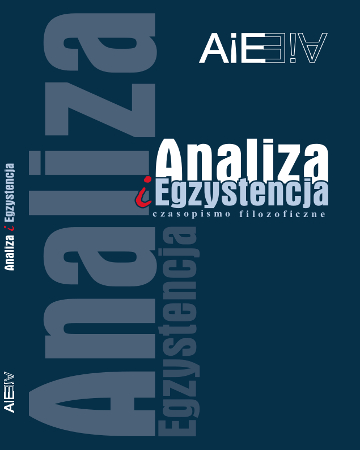
ISSN: 1734-9923
eISSN: 2300-7621
OAI
DOI: 10.18276/aie.2022.57-04





Issue archive /
57 (2022)
Autointerpretacja osoby i problem „mocnego wartościowania” w filozofii Charlesa Taylora
(Self-interpretation of person and the problem of “strong valuation” in Charles Taylor’s philosophy)
| Authors: |
Mariusz
Wojewoda

Uniwersytet Śląski w Katowicach |
| Keywords: | self-interpretation “strong evaluation” person conversation recognition Charles Taylor |
| Data publikacji całości: | 2022 |
| Page range: | 20 (71-90) |
Abstract
The article aims to analyse self-interpretation concerning the formula of “strong valuation” and the issue of the human person. The subject of the analysis is Charles Taylor's concept of values in the context of his philosophical inspirations and criticism of some of his solutions. Getting to know oneself takes place in the context of discovering and realizing such values as freedom, dignity, authenticity, agency, and responsibility, etc. It is possible to point to the relationship between the axiological structure and the person that allows for self-interpretation. On the one hand, thanks to values, the subject determines its own identity. On the other hand, values constitute an element of the “community of meanings” - enabling understanding of the “human situation” and dialogue between persons. We discover the world of values while articulating and interpreting our feelings and sense other people's feelings. Values enable us to talk about what unites or divides us, will allow us to communicate, and also allows us to articulate the causes of misunderstanding. The development of the person is mediated by cultural expressions and dialogue with other actors. Taylor's concept is an exciting and vital attempt to combine reflection in the field of human philosophy, the theory of values, and the philosophy of the culture of expression.
Download file
Article file
Bibliography
| 1. | Abbey, R. (2000). Charles Taylor. London & New York: Routledge. |
| 2. | Anderson, J. (1996). The Personal Lives of Strong Evaluators: Identity, Pluralism and |
| 3. | Ontology in Charles Taylor’s Value Theory, Constellations: An International Journal of Critical and Democratic Theory 3 (1), 17–38. DOI: 10.1111/j.1467-8675.1996.tb00041.x |
| 4. | Batttro A., Dehaene, Sánchez Soredno M. and Singer W.J. (red.) (2013). Neurosciences and the Human Person: New Perspectives on Human Activities Pontifical Academy of Sciences, Scripta Varia 121, Vatican City; www.casinapioiv. va/content/ dam/ accademia |
| 5. | Frankfurt, H.-G. (1997). Wolność woli i pojęcie osoby. Tłum. Justyna Nowotniak. W: Filozofia moralności. Postanowienie i odpowiedzialność moralna. Wybrał i wstępem opatrzył J. Hołówka, (21–40). Warszawa: Wydawnictwo Spacja– Fundacja Aletheia. |
| 6. | Gadamer, H.-G. (1976). Philosophical Hermeneutics. Tłum. D.E. Linge, Berkeley: University of California Press. |
| 7. | Gadamer, H.-G. (2003). Język i rozumienie. Wybór i tłum. P. Dehnel, B. Sierodzka, Warszawa: Fundacja Aletheia. |
| 8. | Gadamer, H.-G. (2008). Teoria, etyka, edukacja. Eseje wybrane. Tłum. A. Przyłębski. Red. P. Dybel. Warszawa: Wydawnictwa Uniwersytetu Warszawskiego. |
| 9. | Heidegger, M. (1994). Bycie i czas. Tłum. B. Baran. Warszawa: PWN. |
| 10. | Laitinen, A. (2003). Strong Evaluation Without Sources. On Charles Taylor’s Philosophical Anthropology and Cultural Moral Realism. Jyväskylä: University of Jyväskylä. |
| 11. | Laitinen, A. (2006). Interpersonal Recognition and Responsiveness to Relevant Differences. Critical Review of International Social and Political Philosophy 9, no 1, 47–70. |
| 12. | Lara de, P. (1998). From Philosophical Anthropology to the Politics of Recognition: An Interview witch Charles Taylor, Thesis Eleven, 52, 103–112. |
| 13. | Lorenc, W. (2012). Możliwości i ograniczenia hermeneutycznego ujęcia człowieka, Analiza i Egzystencja 19, 199–218. |
| 14. | Lorenc, W. (2012). Filozofia hermeneutyczna: perspektywy jej rozwoju, Przegląd Filozoficzny – Nowa Sera, 3 (83). R. 21, 533–546. |
| 15. | Merlau-Ponty, M. (2001). Fenomenologia percepcji. Tłum. M. Kowalska, J. Migasiński, Warszawa: Fundacja Aletheia. |
| 16. | Note N., Merus P. (2009) Charles Taylor and a Hermeneutical Understanding of Meaningfulness, Sofia Philosophical Review 3, 1 (January), 137–149. |
| 17. | Parfit, D. (2001). Tożsamość osobowa. Tłum. Renata Wieczorek. W: Filozofia podmiotu. Fragmenty filozofii analitycznej. Red. J. Górnicka-Kalinowska, Warszawa: Fundacja Aletheia, 65–91. |
| 18. | Smith, N.H. (2000). Moral Realism. In: H. LaFollette (red.) Blackwell Guide to Ethical Theory. Oxford: Blackwell, 15–37. |
| 19. | Smith, N.H. (2002a). Charles Taylor. Meaning, Morals and Modernity, Cambridge: Polity Press. |
| 20. | Smith, N.H. (2002b) Overcoming Representationalism. In: Perspectives on the Philosophy of Charles Taylor, eds. A. Laitinen, N.H. Smith, Helsinki: Societas Philosophica Fennica, s. 29–42. |
| 21. | Taylor, Ch. (1985a). Philosophical Papers. Vol. 1: Human Agency and Language, Cambridge: Cambridge University Press. |
| 22. | Taylor, Ch. (1985b). Philosophical Papers. Vol. 2: Philosophy and the Human Sciences, Cambridge: Cambridge University Press. |
| 23. | Taylor, Ch. (1992) Multiculturalism and „The Politics of Recognition”. Pincerton, New Jersey: Pincerton University Press. |
| 24. | Taylor, Ch. (1995). Philosophical Arguments. Cambridge MA: Harvard University Press. |
| 25. | Taylor, Ch. (2001a). Pojęcie osoby. Tłum. R. Wieczorek. W: Filozofia podmiotu. Fragmenty filozofii analitycznej. Red. J. Górnicka-Kalinowska, Warszawa: Fundacja Aletheia, 420–421 |
| 26. | Taylor, Ch. (2001b). Samointerpretujące się zwierzęta. Tłum. R. Sierszulska. W: Filozofia podmiotu. Fragmenty filozofii analitycznej. Red. J. Górnicka-Kalinowska. Warszawa: Fundacja Aletheia, 261–298. |
| 27. | Taylor, Ch. (2001c), Źródła podmiotowości. Narodziny tożsamości nowoczesnej. Tłum. M. Gruszczyński i inni. Warszawa: PWN. |